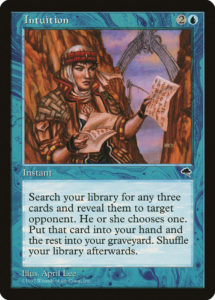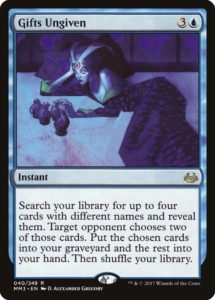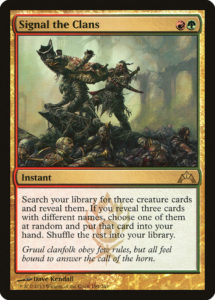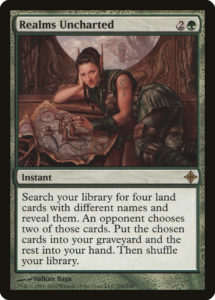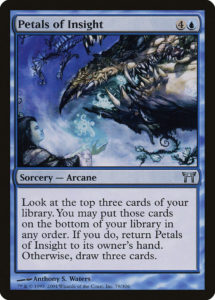A few weeks ago, I had the pleasure of hanging out with more Hipsters at once than I have in years. We drafted Derek‘s cube at Dave‘s house with Zack and Urchin (who I met for the first time. She’s awesome). I cast my first ever Truth or Tale, leading me to cover it in depth and Urchin to suggest I write about Intuition, another head-scratcher of a card. So, as we wait for Ikoria spoilers to begin later this week, let’s dig into that card from my favorite childhood set.
Design Intent =/= Player Execution
Intution is one of Magic’s best examples of a card not functioning as the designer intended, as well as why playtesting outside of your team is so important.
The goal of Intuition‘s design is creating an interesting puzzle for your opponent—which card do you actually want most and how can you craft a pile such that you’re always satisfied? Unfortunately, Intuition doesn’t say you have to find three different cards, so you can just grab three copies of the same card and have an instant speed Demonic Tutor.
You can even do silly things like grab three copies of Lingering Souls for maximum value. That defeats the intent of the card, forgoing a difficult tutoring challenge in favor of a far easier and more powerful guaranteed result. (It also refers to Intuition, a concept that’s far more red/green than it is blue, so the card’s also problematic in its flavor.)
Those Pesky Rules, Though
Gifts Ungiven is the second take on Intuition, and it’s much more successful—though it still has a big asterisk. Gifts Ungiven insists you find cards with different names, but lets you both find and keep one additional card for your trouble. Having played with and against this card, it’s much more challenging to play with and against, since people can craft piles with cards like Eternal Witness, Snapcaster Mage, Raven’s Crime, or Life from the Loam to basically guarantee access to what they want. There’s a lot more skill in deckbuilding and resolving Gifts Ungiven than there is to finding three copies of the same card for Intuiton.
And yet, Gifts Ungiven has a rules issue that Intuition lacks. While Intuition‘s loophole stems from letting you find any card with no restriction, Gifts Ungiven‘s demand to find cards with a specific property opens up a new loophole: failure to find. When you’re searching a hidden zone like your library, you don’t need to succeed at finding everything you’re instructed to (since your opponent isn’t allowed to check your work). Since 2012, a lot of Gifts Ungivens have been only finding two cards: Unburial Rites and a giant creature to reanimate.
I love that Gifts Ungiven and Intuition both have unintended utility, and that these accidental uses stem from opposite causes. Intuition has no restriction, so as long as you have 3+ cards in your library, you must find three cards. Gifts Ungiven can let you find anywhere from 0-4, but they must be different. This is a tricky balance to try to walk and our next card shows the final evolution of this specific experiment.
Perhaps we went too far…
Signal the Clans is the ultimate expression of Intuition‘s intent, not its play pattern. It forces you to find exactly three cards with different names—if try to cheat and find fewer than three, or if you find multiple cards with the same name, you get nothing.
The most immediate issue this depowered Eladamri’s Call has is remembering how restricted it is. Given its power level, it’s not the kind of card you’ll often see outside of Limited; it’s easy to misremember what a less powerful rare does in draft. The only time I resolved it, I had a draft deck with almost no duplicate creatures. I thought, “Oh, this is the spell that gets me one of three random creatures,” grabbed the best creature in my deck, and two other decent ones. It turns out the two decent creatures were the only duplicate creatures in my deck. I’d forgotten a crucial line of text, and I’d cast a two mana spell that read, “show your opponent you’re a silly duck, then shamefully discard this.” That wasn’t exactly a great play experience, and it’s a consequence of incredibly rigid templating to enforce a specific play pattern.
But there’s a second issue at play, one that makes Signal the Clans substantively different from Gifts Ungiven and Intuition. Those cards are designed around a connected pair of interesting choices—you creating a choice for your opponent to make. Signal the Clans focuses so hard on the creation of the choice that your opponent’s input is replaced by randomness. So much effort is expended in making the card work properly that most of what makes it interesting is lost in translation.
What else counts?
As I researched this piece, I realized that only four cards felt like they obviously are Intuition effects: Intuition, Gifts Ungiven, Gifts’ less popular cousin, Realms Uncharted (which no one has managed to break, but it really feels like it should be broken sometime), and Gifts Given (the holiday card I’ve sadly never gotten to play with). They all involved you searching your library, assembling an array of options, and your opponent selecting which you’d receive.
At their core, they are powerful tutor effects with a twist. Magic can’t afford to do all that often, given how important variance is; but we can expand this definition quite a bit by tweaking our parameters.
What if you don’t get to search your whole library? Steam Augury reverses the order of Fact or Fiction to match Intuition‘s. The card’s weaker and plays very differently.
What if you don’t make the piles? Guided Passage gives your opponent an annoyingly large task by making them select three different cards from all the cards in your deck. Distant Memories lets you make only one of the two piles, but the other is random—the card would be a lot more interesting if both piles were face down and your opponent had to guess whether the card you tutored was better than a Concentrate.
If we leave out both of these restrictions, a host of other cards enter the discussion. There’s Covenent of Minds‘s fairly bland choice—three known cards or five random cards (it’s almost always better to give your opponent a Brilliant Plan than a super Tidings). Allure of the Unknown and Dubious Challenge provide powerful high-risk benefits that you can abuse with the right tools. Tasigur, the Golden Fang‘s random effect synergizes nicely with his Delve. Sword-Point Diplomacy and Animal Magnetism leave you at the mercy of both your opponent and the top of the deck, while Manifold Insights looks at enough cards that you’ll probably find something good (but want to have enough opponents that you can get it).
Defining Intuition
Where do we draw the line between what is and what is not an Intuition effect? I can see an argument for Guided Passage, since its casters chooses to craft a deck to maximize its effect. Steam Augury involves more improvisation in the moment than Intuition, since you don’t tutor your piles; but it does involve you crafting a decision for your opponent and feels like it could fit the definition.
Sword-Point Diplomacy really doesn’t feel like it counts, as it’s far more of a Browbeat successor than an Intuition descendant. I can’t say where the precise line for Intuition cards, but I’m curious what passes the sniff test for me and others, and what doesn’t.
Anyway, hopefully you and Urchin enjoyed this (since I did write this at her recommendation). I certainly did. It let me stretch some of my old philosophy muscles in trying to define a family of cards, which has been a nice change of pace amidst less enjoyable upheaval. But for now, here’s looking forward to finding out what it means to Mutate creatures and researching the design forebears of it and Ikoria’s other new mechanics.
And, as always, thanks for reading.
—Zachary Barash is a New York City-based game designer and the commissioner of Team Draft League. He designs for Kingdom Death: Monster, has a Game Design MFA from the NYU Game Center, and does freelance game design. When the stars align, he streams Magic (but the stars align way less often than he’d like).

